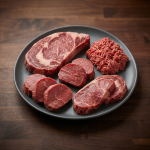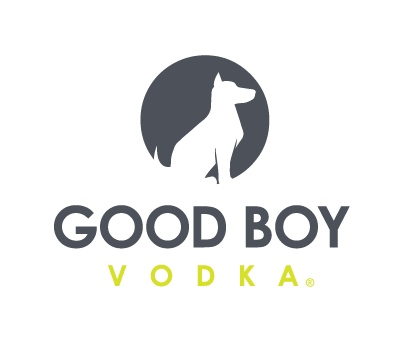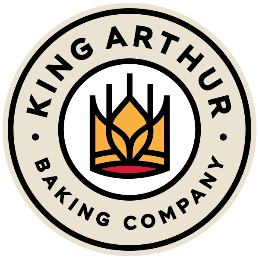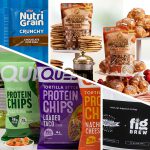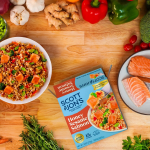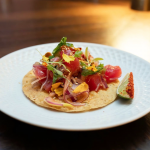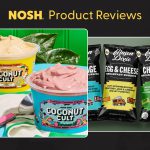Amid Outbreak, An Industry Adapts
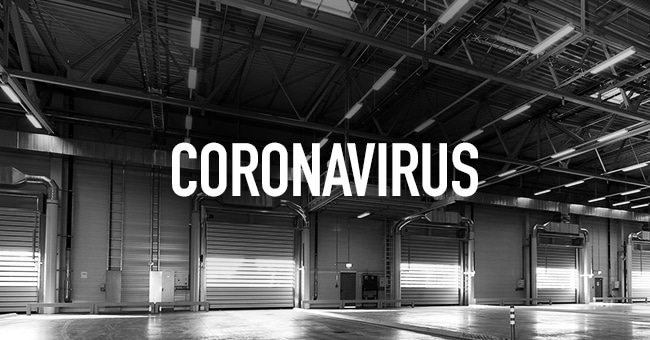
On the manufacturing lines and in the office, the CPG industry is being forced to make adjustments.
Over the past week, BevNET and NOSH edit staff reached out to brands and distributors across the food and beverage to hear about how they are grappling with the effects of the global COVID-19 pandemic as it ripples across the country. Their responses show an industry that, even as immediate demand for their products soars, is vacillating between measured caution and deep concern, and one that is anxious over the growing multitude of unknowable factors that will condition their responses over both the long and short term.
Safety First
While economic upheaval looms, the health and safety of employees is the most pressing immediate concern for food and beverage makers.
All the brands we spoke to for this story have restricted business travel and authorized any employee with the ability to work from home to do so. These include brands in states that have instituted mass lockdowns barring all non-essential business and gatherings, such as California and New York, though many had already implemented their own guidelines prior.
For brands that do their own manufacturing, exercising an overabundance of caution in adhering to sanitization and Good Manufacturing Practices (GMP) is the new normal. At Health-Ade, on top of doing “about six times the amount of sanitization that we did before, which was already the highest recommended,” CEO and co-founder Daina Trout said the company is both shifting elderly employees into temporary work-from-home roles and simply being “hyper strict.”
“You can’t come in the door if you have a temperature. You can’t come in the door if you even have a sore throat. You can’t come in the door if you have a sniffle,” she said. “So as a result we have a lot more absenteeism, which is impacting our production, but we’ve done a good job of having everybody on the staff know how to back up each other’s roles. So we feel in a strong place there.”
Yet, as Trout said, “it’s important to me that I’m not sitting at home as my manufacturers and workers are coming in.” She still comes to the production facility, which, as others have done, is using staggered shifts and six-foot minimum distancing to minimize the amount of interpersonal contact.
For brand leaders, simply grappling with the question of keeping manufacturing going is a challenge.
“I think the other hardest thing is when you think about putting your employees first,” said Samantha Abrams, co-founder of keto snack brand Emmy’s Organics. “Is it better for them to be at work getting a paycheck and supporting their families? Or is it better for them not to be in a small group of people? That’s a really hard thing to think about and debate in your own head.”
But if you’re continuing, safety requires its own supply chain, as brands strategize around potential shortages of protective personal equipment (PPE), such as sanitary gloves and hairnets, even while governments and hospitals race to supply health professionals on the outbreak’s front lines with essential gear.
“Our staff wears masks every day,” Abrams said. “It doesn’t matter what’s going on. We need to make sure that we will also have a supply of all of those types of supplies in our supply chain for health and safety. So that’s a concern.“
When reports of the coronavirus began appearing in the media in December, Nicole Ledoux, co-founder of natural snacks maker 88 Acres, began reaching out to PPE suppliers to get “backups for backups” in anticipation of further disruption down the line.
“I think we just got lucky,” she said.
Surging Sales, Shifting Schedules
Perhaps now more than ever, getting food and beverage products safely into the hands of consumers and keeping business flowing requires brands to be nimble and adaptive.
Broadly speaking, the brands we spoke with did not report experiencing significant issues in getting products on to store shelves amidst the COVID-19 outbreak, even as they experienced a sudden jump in demand. Many praised the spirit of collaboration amongst distributors and retailers in tackling the extraordinary situation, with one overriding theme: communication, communication and more communication.
“I’m not really experiencing any changes except that we’re having increased demand, so there’s increased line running,” said Trout. “All of our distributors are introducing increased protocols and precautions as it relates to the virus, and we’re making sure we’re not contributing to any kind of increased spread or anything like that, just by people being out and connecting. Everybody’s on board with that and we’re all collaborating and sharing ideas, so that’s been pretty awesome to see.”
Greg Forbes, CEO of Ethical Brands, parent company of pasta brand Explore Cuisine, praised retailers for reaching out, some of whom have offered to waive fees.
“So it’s really good to see that there’s a sort of a level of camaraderie that’s coming up, which is the most important thing: to get products for people who want to buy it, and do that in a very sensible and balanced way.”
In response to soaring demand, brands are mobilizing staff to attend to areas of urgent need.
“What we’ve done as an organization is essentially just taken with everyone that was working with us in marketing and sales and finance and focused everyone on product supply,” said Forbes. “So what we’re trying to do is sort of look at every order when it actually comes in.”
According to Harmless Harvest CEO Ben Mand, the coconut water maker, which sources from farms in Thailand, ensuring retailers can replenish stock from distribution centers has been a bigger concern than supply chain hiccups, so far. That has been a widely reported issue in the grocery landscape, and not just for Harmless Harvest, however, as stories of shortages on the aisles have also been met with reassurances from the broader food industry that there is plenty of product in the system overall.
Meanwhile, in the field, all activity has come to a sudden halt. Sales team ride-alongs, demos and live marketing activations are on hold, as brands run into the reality that person-to-person interactions and events just aren’t happening for the foreseeable future. While waiting for conditions to improve, some brands are going back to the basics.
“Right now it’s about the fundamentals,” said John Herman, EVP and GM of North America at Nutrabolt. “The idea of customer meetings and business development, it’s been downplayed on the retailer side and our side, because people are more focused about making sure if you’re a retailer, you have your product stocked.”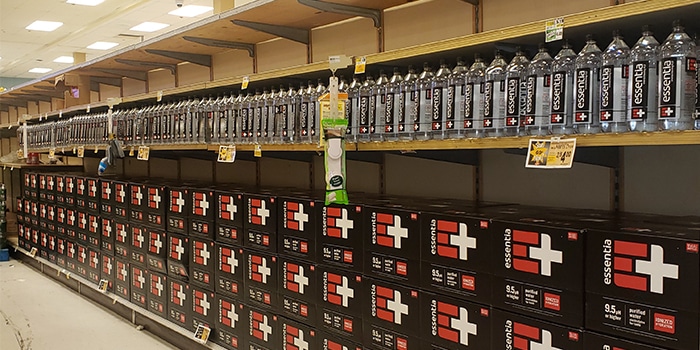
More Americans staying at home has also meant a spike in ecommerce activity, according to many brands. Forbes reported his company’s Amazon sales doubled last week, and Trout said that Health-Ade invested in a website revamp to handle the increased volume of orders, while also highlighting home delivery options in its brand communications. According to Flow Water CEO Nicholas Reichenbach, the company has seen a 300% increase over the last two weeks.
During periods of heightened demand, brands that handle fulfillment for their own DTC sales as well as sell on Amazon have the extra challenge of keeping both sellers stocked with product.
“We’ve definitely seen in the past couple of days it’s starting to grow,” Abrams said of her company’s e-commerce sales on both Amazon and its own website. “I think during this time, because our web sales fulfillment area is kind of separate from everything else in the building, that we are still going to be able to fulfill orders as usual. So I think online orders are going to be a real life force for us during all these changes.”
Preparing For Unpredictability
But it’s hard to predict beyond the short term. Underscoring the speed of developments, in just the last 24 hours, California Governor Gavin Newsom issued an order for all of the state’s residents to stay at home and for the closure of all non-essential businesses. As of now, that list does not include food and beverage manufacturers, but nothing is guaranteed to be off the table as the crisis unfolds.
“I’m really thinking about people, not just safety from a coronavirus standpoint,” said Trout. “I really feel that we’re doing everything we can do. So I feel really good about that now, but for a good seven days, I was researching every damn thing I could find on this, it was crazy.”
With employees working from home, at least for the near future, brand leaders are learning how to maintain strong communication and company culture under the new conditions.
“We encourage people to not resort to email, but we continue to use video link, Skype, WhatsApp to keep that virtual face-to-face communication because it’s very easy for people to get your emails and lose that human touch,” said Forbes. “I speak to most of the employees, [and] to the key people as often as I can, and I encourage all our team to pick up the phone, talk to people.”
To boost morale amongst staff working remotely at San Francisco-based Harmless Harvest, located in one of the areas most severely impacted by the outbreak, Mand is hosting virtual events including a trivia quiz and a guided workout.
“In general, it’s one thing to have good company culture and cohesiveness when you are in the office, but how do you continue to do that in our new norm of everybody on a video call?,” he said.
Some brands have also stepped up to do their part to help during this public health crisis. Hydration mix maker S.O.S. has donated 5,000 packs of product to health care workers and affected families through its partnership with disaster relief non-profit group the Global Empowerment Mission/#BStrong. Elsewhere, Vita Coco, in response to a reported 100% increase in sales across major retailers, announced today a $1 million collective donation to support the COVID-19 Response Funds of hunger-relief organizations Feeding America and No Kid Hungry.
In a press release announcing the donation, Vita Coco CEO Mike Kirban said it has been “really jarring” to see his business thriving against the backdrop of a crisis, extending a challenge to other businesses that have also seen a COVID-related sales bump to take a similar position on giving back to impacted communities. Yet even smaller companies like OLIPOP are doing what they can.
“Grocery workers right now, I consider them on the frontline, almost emergency workers and it’s about how can we support them by stocking shelves, lending an extra hand even where we can’t go in physically,” said OLIPOP chief of staff Liz Trowler, adding that the company distributed a promo code to workers “as a thank you to people who might be affected during the quarantine.”
Long-term economic fallout from the pandemic — especially the potential for staff reductions and layoffs — is also a threat. Though none of the brands we spoke to reported they had made any cuts thus far, that’s something that will come to the forefront as cash flow is needed to pay for production.
“I think right now the hardest part is the uncertainty and also just being able to manage everyone,” said Abrams. “Wanting to be supportive and listen to everyone who has concerns. But I think just the uncertainty is the scariest thing.”
Taken in a more optimistic light, proactive and progressive small brands may already be well equipped to take on an uncertain future. Trowler said the company has a new senior director of supply chain set to start work next month, and she is still doing interviews (by video) with candidates for a position on OLIPOP’s East Coast team.
“Generally, I think that this sort of adapt or die mindset and operating lean, it’s sort of what startups are good at, right? ” she said. “And so we’ve pretty much doubled down I think on our forecast. We have no intention of pulling back. I think it’s been our mindset that we’ve been living up to this point to be adaptable and more nimble, and we’re sort of ready for it.”




